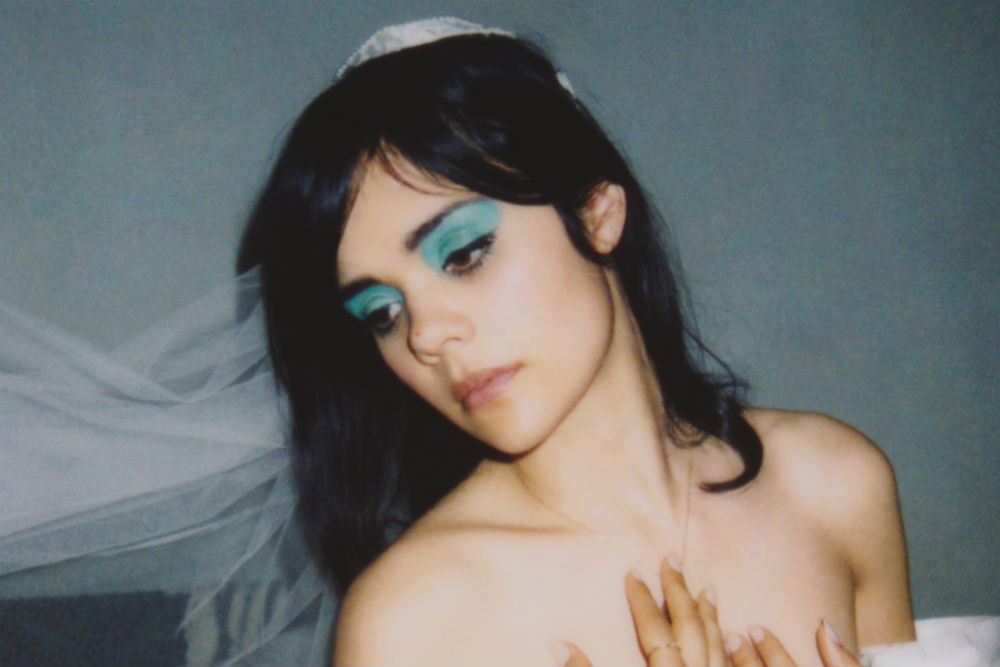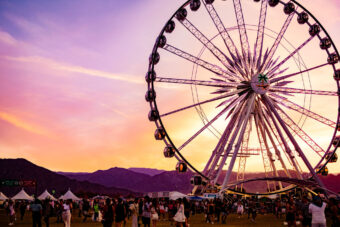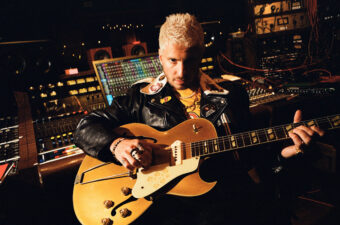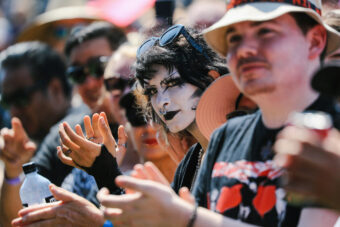At the last minute, the Bride was forced to postpone her march to the altar. Natasha Khan, who records as Bat for Lashes, was scheduled to perform the bulk of her upcoming album, The Bride, at Brooklyn Heights’ St. Ann & the Holy Trinity church on June 1; the gig was supposed to be the New York installment of a run of shows designed to mimic a wedding, in keeping with the record’s title and theme. The audience was encouraged to wear formal attire — Khan herself would wear a gown. But, hours ahead of the ceremony, a potentially tragic accident: A chunk of the ceiling came loose and crashed down right where sound check was about to take place.
“It landed on a cross-spot, where one of my band members would have been standing,” Khan says about a week after the incident, lounging in Warner Bros. Records’ Midtown Manhattan office. “I just burst into tears because I was so excited about playing there.”
The whole affair was rescheduled for the following day and relocated to a more traditional venue (Music Hall of Williamsburg), so the 36-year-old English singer-songwriter was able to take the stage in Brooklyn, blood-red dress and all. But the sudden scare and day-of changes bear an eerie similarity to the narrative behind Bat for Lashes’ stunning fourth album: Envisioned over the past two years, The Bride is a concept record that tells the story of, well, “the Bride” who navigates self-discovery after she learns, at the altar, that her groom-to-be has died tragically in a car wreck on his way to their wedding.
Exploring ideas of romance, loss, solitude, and acceptance, the album was written as a soundtrack for a feature-length film that has yet to be made, and it plays out like a fever nightmare. Its 13 somber tracks feel cloaked in fog, pressing forward with caution whether they’re driven by percolating synths (“In God’s House”), adorned with aching strings (“I Do”), or elevated by Khan’s mesmerizing voice (“I Will Love Again”). As fantastical and fleshed-out as its fictional world is (the press materials include a prologue for the album called “Chapter One,” written by Khan and co-producer, Simone Felice, formerly of the Felice Brothers), The Bride is more grounded than the cosmic art-pop that filled Bat for Lashes’ previous LPs. This project possesses a confidence, fullness, and focus that Khan has been building toward ever since her debut, Fur and Gold, arrived a decade ago.
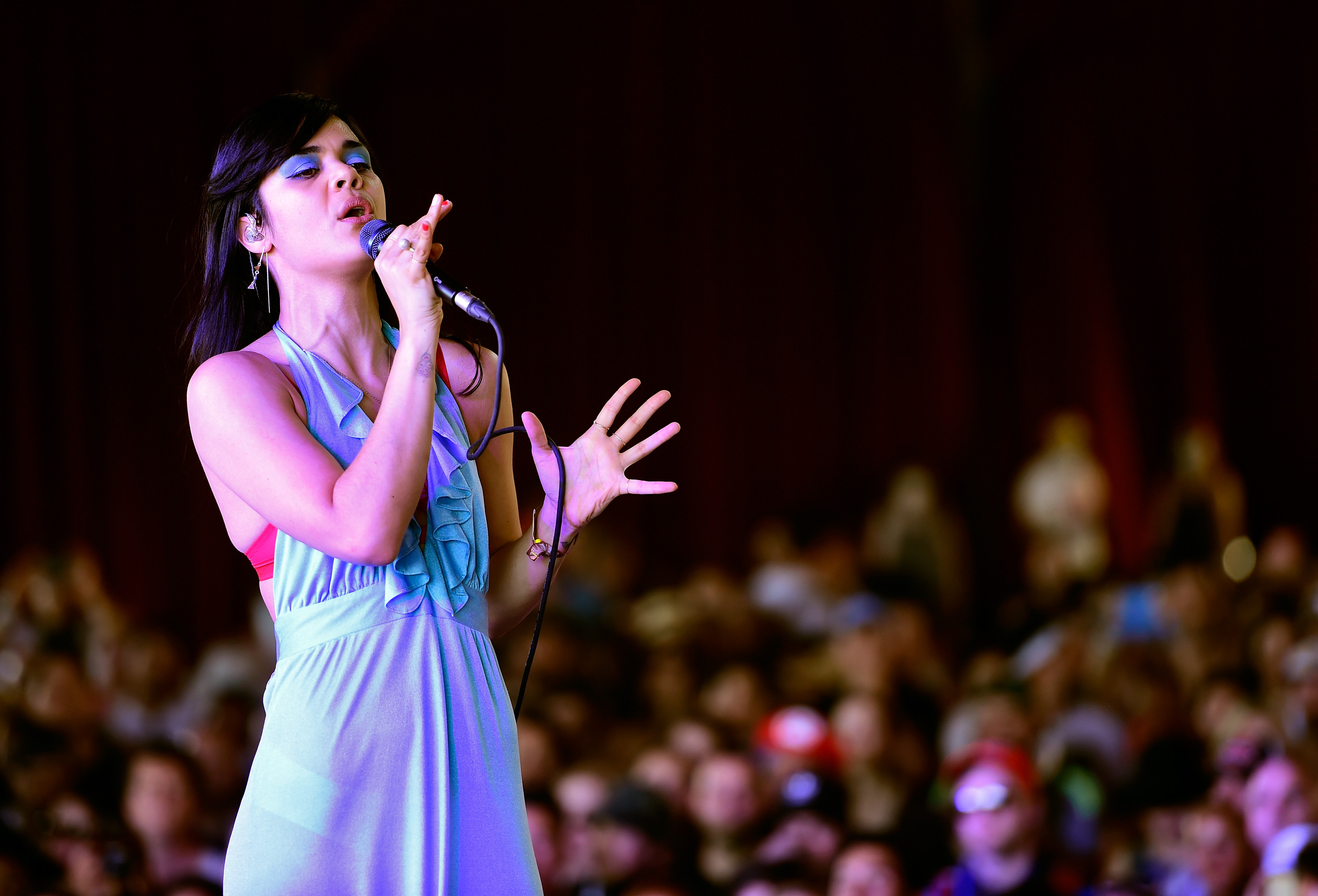
Also Read
Bat For Lashes – “Desert Man”
In advance of the new record’s July 1 release, we had a conversation with Khan — which has been edited and condensed for clarity — about the creation of The Bride, her own experiences with weddings and marriage, and the meaning of true love. You are cordially invited…
I’ve read that, for this album, you drew on a host of pop-culture influences — The Wizard of Oz, the work of David Lynch — and the atmosphere where you recorded, in upstate New York. Did you also pull from any doomed romances in pop music? Like the videos for Guns N’ Roses’ “November Rain” or Céline Dion’s “It’s All Coming Back to Me Now?”
No, but I love those — I didn’t reference any of those things. Doom Generation, True Romance, Natural Born Killers, Paris, Texas, there’s so many things I could talk about. It’s hard to pinpoint any one thing. I feel like when I’ve been making the videos, I’ve just sat down and really have been like, “I see the Bride on the highway, I see Joe in his jacket,” and thinking of films like Rebel Without a Cause and Guys and Dolls, and Elvis.
All of these references pop in, but the reason I love the Bride so much is because she is deeply me and her DNA is made up of all of those things that have amalgamated to create this lone girl in a landscape. I think, because I’m presenting the Bride in this music-video, pop-music angle right now, those references are more black and white. But once the feature film comes, I think people will really understand the nuances and subtleties, beyond reference.
So there are hard plans to put out a feature film?
Well, there are hard intentions. I’m writing it at the moment to be adapted for screenplay. And because I did my short film [I Do, debuted at this year’s Tribeca Film Festival] and it’s been doing nicely, there are production companies and people really interested to see how it develops and I think there would be support there, which is super exciting.
This album feels very much like a journey inward. Over the two years you spent making it, is there anything you learned about yourself that surprised you?
It’s difficult to say. In hindsight, I’ll look back over what my subconscious was saying, and now that it’s been brought into the light, I’m conscious of that kind of emotional journey or learning. So I guess what I’ve been learning is the story of the Bride — that you can’t really rely on external factors to make you happy. We create so many illusions and projections about things that will make us happy in the material world, like a lover or a house or an adventure or companionship, or whatever it is you want.
I think I’ve realized that my happiness depends on the health of my mind and the state that I’m in on any given day. The Bride, by the end of the album, learns what real love is, and I think real love between two individuals is that you can stand next to someone and hold the space and love them unconditionally through their own journey of learning to be themselves. Before, I thought true love was being swept off my feet and all these Cinderella archetypes that we’re fed. And I’m sure guys feel that too. It’s learning that it’s not as heightened as expected, and it’s down to you — which is boring and annoying, but the responsibility lies with you.
Do you enjoy going to weddings?
Mm-hmm. I think I am fortunate to have gone to many varied weddings. One of my favorite weddings was when my friends got married in Brighton [in England] and they used a barn that was part of Charleston House, which was where Virginia Woolf’s sister, Vanessa, and [artist] Duncan Grant lived. It was just this dusty old space, and so all of us friends helped them clean and set up tables and put up bunting and there was a big English meadow with flowers next door. It was done on a small budget and very intimate and so romantic. It was all about community and supporting each other, and having a really sweet, quiet day. There wasn’t any weird politics. They didn’t do all of the big ice cake or anything like that.
The thing about weddings is that they make me want to get married more when I go, rather than less. It’s just because of the moments when they say things like, “And now, can all of the married couples in the congregation just hold hands and remember their vows and remember that we’re here to support this couple, so if they ever go through trouble, which they probably will, that we’ll be an ear for them, that they’ll come talk to you and we’ll support them through the ups and downs of marriage.” I think that’s a really important sentiment in this age of throwaway relationships. If you work through the death of something, it can’t not come back to life. There’s a cyclical nature to longterm things.
Did you talk to any friends or family who are married about their weddings or marriages while you were writing this record? Or did you go off of the narrative you had in your head and your own feelings about relationships?
I think I went off my own imagination and experience more because the album’s not really about marriage. It’s about the construct of marriage and brides. I love that [the wedding is] a ritual that we all recognize. We all recognize that it has to have these things in order to work. I found it interesting to put her in that situation and then f**k it up, so that she has to move in a different path, a different way. The Bride can only fulfill her role as a bride if the groom turns up and I like the idea that she has to go on the honeymoon alone, doing something alone that intrinsically takes two people.
I know the narrative’s about the Bride, not about Joe, the groom, but is it safe to say the album’s less about the death of a groom and more about the death of fairytale romance?
The groom is definitely more of a symbol of something. He’s present throughout the whole record in his lack of presence, but I also think he represents the dangling of a certain type of carrot, but he comes through for her in a much deeper way. What she thought he was going to bring her was very surface, and by the end, it’s the key to her heart and herself. The image of who she was is shattered and she really comes into her own through him. It’s guidance in that he’s the catalyst that pushes her onto that journey.
When you were young, your father wanted you to be in an arranged marriage. While making this record, did you find yourself revisiting that experience, thinking about how your life could have turned out if you went through with it?
I have no idea how that would have turned out, but I don’t think that I would have had the freedom to do what I’ve done. Sometimes when I get sad about the fact that I’m not a normal person, and I’m not married with kids yet, I do think about if I had done that then. I would be so sad that I wouldn’t have fulfilled my sole mission of being a musician and artist and communicating all of these things to people. I’m glad that it turned out this way.
I probably would be very frustrated if I had gotten married so early. There is a dichotomy with me because I love kids and I love family time and community, but I’m definitely a lone wolf in terms of my process and how I make my work, and I think that’s something I’m still trying to reconcile.
When you were growing up, did you have a dream wedding in mind?
No, I never thought about what I’d wear until I had to do the photos for The Bride. The only fantasy I had was to get married in Hawaii because I was in love with Kurt Cobain and I saw that he got married [in Hawaii] in his pajamas, and I was like, “That’s so cool.” So I used to have fantasies about marrying him in Hawaii with a seashell bra and a hula skirt and a big, red, Billie Holliday flower.
That’s funny, I feel like a lot of people — boys and girls — have a lot of fantasies about getting married.
Maybe I just never really liked anyone that much! No, I’m just kidding. I just never got so attached to that idea. I’m quite a rebellious person. Marriage is more about how my heart feels about someone. The romance of togetherness rather than inviting tons of other people to do something. In my mind, it’s just me and the other person. I don’t think about what my sister and bridesmaids would wear, that’s just never even entered my mind.
But you’ve said that these archetypes about marriage are sort of ingrained in you because they’re part of the culture.
The archetype for me is more about a man rescuing you, and being everything you wanted — make him yours and then life is great and you never have to worry again. The kind of idea that’s at the end of every romcom you’ve ever seen. But I’m always interested in what happens when you walk off into the distance, because that’s when the s**t hits the fan, usually. I hear from a lot of people that the first year of marriage is the hardest.
I’ve read a book called Women Who Run With the Wolves, where there’s a story called “Skeleton Woman,” about the death of that romantic phase and [how] love can’t actually grow or prosper if that phase doesn’t die. It’s about this fisherman who hooks up a skeleton, this terrifying hag who’s been living at the bottom of the ocean, and she trips behind his boat because he’s rowing fast — he’s scared of what he’s brought up. It’s all about the strength of a man to sit with a woman and see her ugliest, darkest sides, and go through that with her to then see the beauty in her vulnerability and humanness, and the cracks that make her unique and beautiful to him.
I think that when you get married, it’s this heightened experience and everything’s so perfect, and you say, “I want the perfect wedding, I want the perfect wedding!” There’s this horrible desire for external accolade or acceptance, which I think is rife nowadays, what with Instagram and Facebook. There’s this need for approval of your relationship from everyone outside, and it just f**king makes me feel ill. That’s not what love is about. But you shouldn’t deprive people of the actual ritual, because rituals are very important to humans, and sharing things with your community and having people walk you through those life-changing times is really a beautiful thing.
I think the Skeleton Woman will rear her hag’s head, and you need to be able to deal with that darkness. And then if you move onto a family, with childbirth and all those things, it’s animal, it’s f**king real, and it’s not Instagram-friendly. I’m interested in the reality of things. My first relationship was eight years long, from the age of 18 to 25, and I loved my boyfriend so much but we went through cycles for sure. I think I fell in love with him, like, ten times, but in completely different ways. There was a death of one kind of love, and then a birth of another one. I feel like that’s the hero’s journey, really.
https://youtube.com/watch?v=Ds9eR3UbOXk
Have you ever been close to getting married, aside from that near-arranged one?
Yeah. [Laughs.] Maybe. I think I haven’t done it because I thought I still had a ways to go with learning to be just me. There is that tendency to want to be rescued and looked after, and I find life sometimes overwhelming and too much. But I don’t think it’s marriage that’s going to help me with that. I kind of want to marry someone when we’ve had, like, five babies and we’re 60.
Do you now, as an adult, ever fantasize about a wedding?
I know that if I got married, it would be in nature. I think it’s just really important to be with a small group of people you love, just outside with trees and pine forests. Or in Hawaii.
What’s your favorite on-screen marriage?
Blimey. I can’t actually think of any — maybe you’ve got some suggestions?
Well, they’re not really going to be the healthiest ones. Like, the first one that comes to my mind is Tony and Carmela Soprano.
I never really got into The Sopranos. Parenthood — I was obsessed with that series. I really loved all of their marriages on that because they all went through so much stuff.
This is so corny and embarrassing, but I’m obsessed with Sex and the City. Most girls probably are. There’s this one episode where Carrie has gotten so cynical about relationships and she’s like, “F**k men, I don’t need them! Love’s just rubbish!” and she doesn’t believe in it anymore. And they go to Coney Island or L.A. or somewhere, and she goes out to the beach, and she’s sitting next to this really cute couple who are in their seventies, and they’re just holding hands and [the woman] says, “Should we go in?” And he says, “Oh, I just want to watch that sunset for a bit longer.” And she says, “Oh, you and your pink sky.”
And Carrie’s chewing on the salt water taffy, right?
Yeah! That moment, it makes me want to cry. I just love old people — they know each other so well, and are so settled in those beautiful twilight years. There are those sweet moments that just restore my faith.

